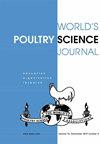The Effect of Housing Environment on Egg Production, USDA Egg Size, and USDA Grade Distribution of Commercial White Egg Layers
IF 3.5
3区 农林科学
Q1 AGRICULTURE, DAIRY & ANIMAL SCIENCE
引用次数: 1
Abstract
The housing environment has become a critical issue for consumers of eggs and egg products. Therefore, it is imperative to understand how various housing environments can affect the modern laying hen. In this study, alongside the 40th NC layer performance test, four different housing environments were chosen based on industry prevalence, which include conventional cages, barren, enrichable colony cages, enriched colony cages, and cage-free environments. Hens in these environments were raised following standard feeding and lighting practices. This study found that conventional cage and enriched colony cage hens had the highest egg production level, while hens from the barren colony cages had the lowest production level. Feed efficiency followed a similar trend, where conventional cage and cage-free hens had the best feed efficiency, followed by enriched colony cage and barren colony cage hens. This study also found that conventional cage hens had the largest eggs, while cage-free hens had the smallest eggs. Cage-free and conventional cage hens had the lowest mortality rate, while hens in the barren colony cage had the highest mortality rate. From the data shown, it appears that standard, conventional cages provide white egg layers with the most optimal environment for production performance. However, a further evaluation of health and stress is needed to determine which environment provides the hen with optimal welfare.饲养环境对商品白蛋鸡产蛋量、美国农业部鸡蛋大小和美国农业部等级分布的影响
住房环境已经成为鸡蛋和蛋制品消费者的一个关键问题。因此,了解各种饲养环境对现代蛋鸡的影响是非常必要的。本研究在进行第40次NC层性能测试的同时,根据行业流行度选择了四种不同的饲养环境,包括常规笼、贫瘠、富菌落笼、富菌落笼和无笼环境。在这些环境中,母鸡是按照标准的喂养和照明方法饲养的。本研究发现,常规笼和强化集落笼蛋鸡的产蛋水平最高,而贫瘠集落笼蛋鸡的产蛋水平最低。饲料效率也呈现出相似的趋势,其中常规笼鸡和无笼鸡的饲料效率最高,强化群笼鸡次之,无群笼鸡次之。这项研究还发现,传统的笼养母鸡下的蛋最大,而非笼养母鸡下的蛋最小。无笼和常规笼母鸡的死亡率最低,而无笼母鸡的死亡率最高。从所示数据来看,标准常规笼为白蛋鸡的生产性能提供了最佳环境。然而,需要进一步评估健康和压力,以确定哪种环境能为母鸡提供最佳的福利。
本文章由计算机程序翻译,如有差异,请以英文原文为准。
求助全文
约1分钟内获得全文
求助全文
来源期刊

World's Poultry Science Journal
农林科学-奶制品与动物科学
CiteScore
6.10
自引率
7.40%
发文量
55
审稿时长
12-24 weeks
期刊介绍:
World''s Poultry Science Journal is the official publication of the World’s Poultry Science Association. The journal provides authoritative reviews in poultry science and an international forum for the exchange and dissemination of information including research, education and industry organisation. Each issue includes poultry industry-related news, regional reports on global developments in poultry, reports from specialist scientific working groups, book reviews, association news and a calendar of forthcoming events. Coverage includes breeding, nutrition, welfare, husbandry, production systems, processing, product development, physiology, egg and meat quality, industry structure, economics and education. The journal is of interest to academics, researchers, students, extension workers and commercial poultry producers.
 求助内容:
求助内容: 应助结果提醒方式:
应助结果提醒方式:


